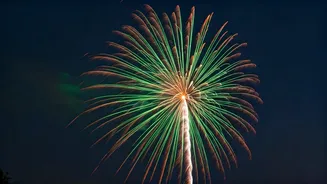Supreme Court's Verdict
The Supreme Court's pronouncement has given the go-ahead for the use of green crackers in the Delhi-NCR region, just a few days ahead of Diwali. This decision
addresses the highly contested issue of firecrackers, particularly in the context of Delhi's notoriously poor air quality. The court's willingness to permit green crackers reflects an effort to balance festive traditions with environmental considerations. This ruling signals a move towards finding solutions that acknowledge both cultural practices and public health needs. The approval includes a period to assess the impact, allowing the authorities to closely observe and manage the effects of this decision on the environment, ensuring that the guidelines are being followed meticulously.
Trial Period Observed
The permission for green crackers comes with a crucial trial period. During this time, the authorities will closely monitor the impact of these crackers on air quality and overall pollution levels. This watchful approach enables the government to gather essential data and evaluate the effectiveness of green crackers in reducing environmental harm compared to conventional firecrackers. This evaluation is very important in making any future rulings regarding the use of crackers during festivals, focusing on sustainable and responsible practices that are suitable for densely populated regions like Delhi-NCR. The outcome of this trial will be critical in deciding the long-term approach to firecracker use during festivals, potentially influencing policy decisions and environmental regulations related to air quality.
Use Conditions Defined
The Supreme Court has imposed a set of strict conditions for the use of green crackers. These conditions are specifically designed to minimize the negative impact on the environment. These restrictions are essential for ensuring that the use of green crackers aligns with the goal of reducing pollution. These stipulations may include limitations on the timing of cracker use, the types of crackers allowed, and the geographical areas where they can be ignited. These rules are put in place to ensure that the air quality does not deteriorate. The implementation and enforcement of these conditions will be crucial. This involves the active participation of local authorities to ensure that guidelines are properly followed, and corrective measures are taken if any violation is identified. The objective is to make sure Diwali celebrations are joyous and that they do not add to the existing pollution challenges faced by the region.















